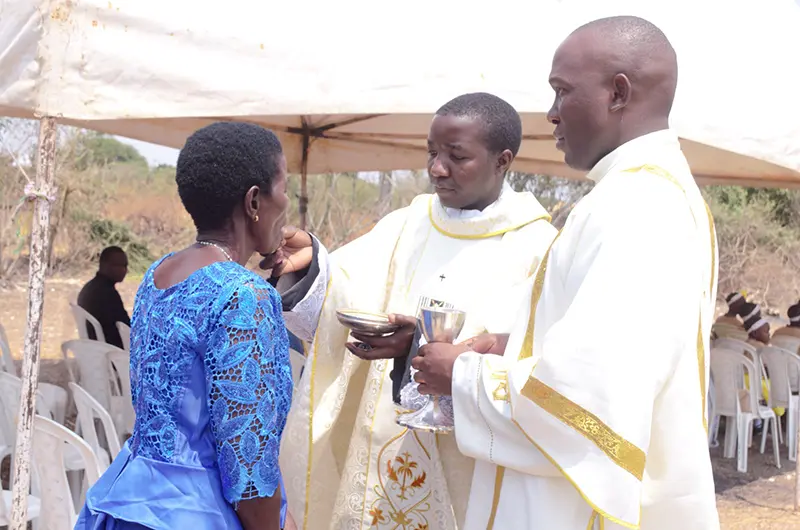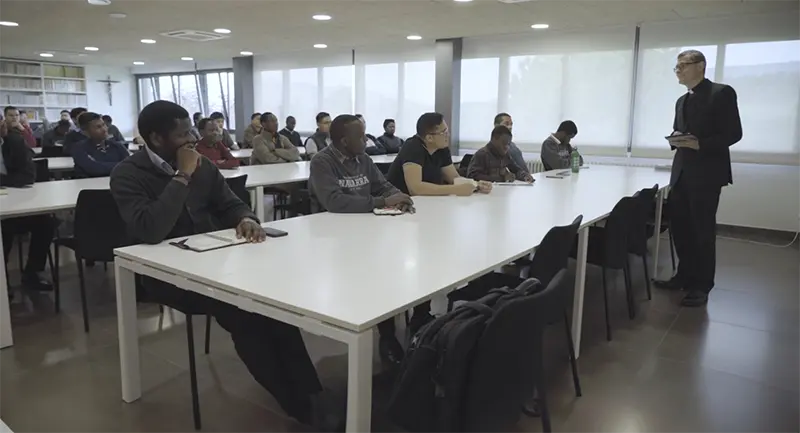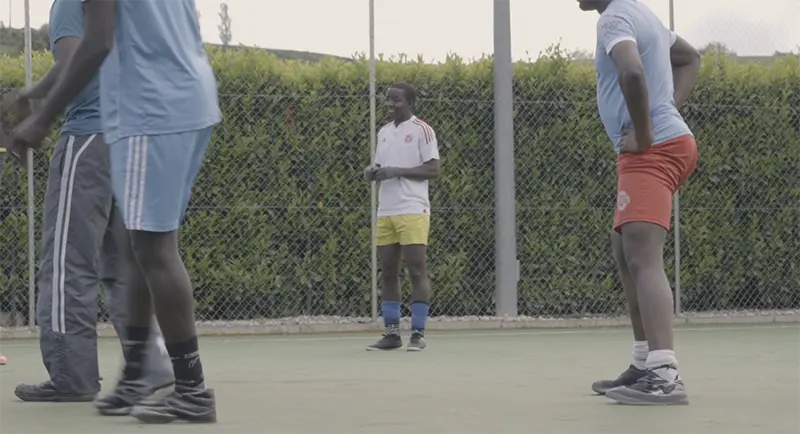“Being Catholic in Tanzania is a source of pride”
Vedastus Martine Machibula is a 30-year-old Catholic priest from the Archdiocese of Mwanza, Tanzania. He lived and trained in Pamplona. He has been a priest for less than a year
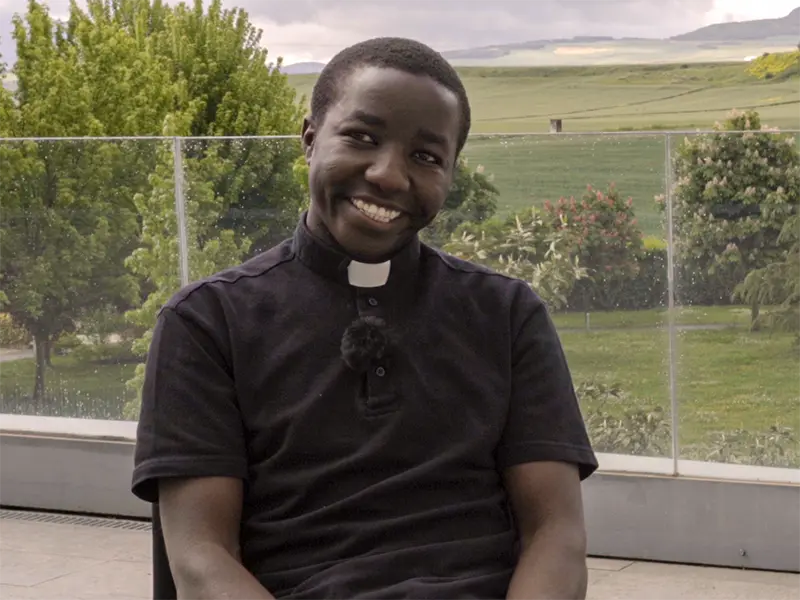
Vedastus was a seminarian at the Bidasoa International Seminary (Pamplona) and was ordained a priest in August 2024 in his country. He tells us that young people in Tanzania are proud to be Catholic. “When you go to Sunday Mass in Tanzania, more than 60% are young people.”
The Catholic formation he received at home is key to his priestly vocation
Vedastus was born in 1994 into a large family. The son of a Catholic mother and a non-Christian father, his vocation arose from a question he asked his mother. Her efforts to pass on the faith to him and his siblings have been rewarded.
A defining moment in this young priest’s life was when he discovered the true importance of priests. His village was seven kilometers from the nearest church, and every Sunday, they traveled that distance to attend the catechists’ celebration of the Word. Mass was only celebrated once a year due to a lack of priests.
Vedastus Martine gives Communion to his mother during her first Mass in Tanzania
The Day a Priest Arrived in His Village
The shortage of priests in Tanzania 30 years ago was much more pressing than it is now: there were only two to serve more than 30 parishes. Today, his diocese has 155 religious and diocesan priests serving 56 parishes.
The day a priest arrived in his village and celebrated Mass, Vedastus was impressed. “I was very young, but I realized it was different from what the catechists did. I was very interested. When I got home, I asked my mother, ‘Mom, why was today different? Who is that man celebrating?‘ “My mother explained to me that this man was a priest and what the difference was between priests and catechists,” Vedastus replies.
“When I grow up, I want to be a priest”
His mother also told him about the importance of priests for salvation, for administering the sacraments, for bringing us the Eucharist and forgiving sins, and about the importance of bringing Christ to the whole world.
“I asked my mother why we didn’t have priests every Sunday, and she replied that it was impossible because at that time the two priests we had were serving 33 churches. So I told her: When I grow up, I want to be a priest to help the Church in my town, so that they always have priests to teach them the faith and celebrate the Sacraments. My mother explained to me that I would have to study hard and be very disciplined. She encouraged me, if it was my path, to speak to my father to see if they could pay for my studies.”
From that moment on, Vedastus asked God every day to make him a good priest so he could serve the people.
Seminarians from the Bidasoa International Seminary during a formation session
Entering the Seminary at 14
So, at 14, he decided to enter the minor seminary, but not without facing some challenges. His father, although he gave him freedom of worship, didn’t get baptized until 2016. Furthermore, his father’s wish was for his son to study medicine, something that was also in Vedastus’s plans.
“I thought that if my father wasn’t baptized, I couldn’t be a priest. However, my father told me: I’ll pay for whatever you need to make your dreams come true. Although I’m not rich, I know how important it is to study. We may lack even the necessities of life, but you won’t lack what you need for your studies. This determination of my father’s inspired an immense gratitude in me that has guided me to always strive in my studies, because I know the sacrifice it has meant for my family,” he explains.
Serving his diocese
However, a career in medicine has not left his mind. He says that while in Fátima in 2023, performing pastoral duties while residing in Bidasoa as a seminarian, he received an email from his archbishop informing him that, after completing his baccalaureate in Theology, he could begin a career in medicine in his diocese.
“It made me think back eight years to when I told my father, after finishing my secondary school studies, that I wanted to enter the major seminary to train as a priest. That was when my father told me his dream was for me to study medicine. After a loving dialogue with my father, we agreed that I could enter the seminary. So this message from my bishop was like a reminder of my first stage and of my yes to the voice of the Lord.”
After considering his bishop’s request, he spoke with him, expressing that at the moment, a career in medicine was “a difficult mountain to climb.” However, if the needs of his diocese demand it, he would gladly study it.
Catholics are on the rise in Tanzania
Their theological training is vital for forming their Tanzanian brothers and sisters. Despite the shortage of priestly vocations, Catholics are on the rise in Tanzania. What is the reason for this explosion of Catholics?
“In my opinion, the fundamental reason and basis of everything is that humankind is religious by nature; it is always related to the divine. This is a fact that is particularly evident in Tanzania: we have a great deal of respect for the divine. But we must also be grateful for the work of the missionaries who evangelized us, and especially the White Fathers. They left an indelible mark, not only on Catholics but on the entire population,” Vedastus relates.
The Church, always in the foreground
This evangelization of the first missionaries has contributed to strengthening the reputation of the Catholic Church in Africa, not only for its spiritual and salvific role, but also for its numerous social works: hospitals, schools, Caritas, etc.
“Many people come closer to God through charitable and social services, because the Catholic Church is always at the forefront. But also, thanks to the work of bishops, priests, religious, catechists, and all pastoral workers, more and more people are coming to know the Gospel,” says Vedastus.
Vedastus, during his stay at the Bidasoa International Seminary, at a soccer match
Young people, proud to be Catholic
The number of young people who practice the Catholic faith is impressive. This young priest marvels: “Youth are the hope of the Church in Tanzania. Young people are proud to be Catholic, and thus they also attract many friends. Besides the Church being seen as the primary place for encountering God, young people also come to parishes to find a husband or wife, grow in virtue, and live the truth.”
In conclusion, Vedastus happily exclaims about his stay in our country: “It has been wonderful. I leave Pamplona a different person than when I arrived. I have been impressed by both the human and academic training.” “It has been a gift to experience the catholicity of the Church.”
Therefore, he would like to wholeheartedly thank all the benefactors of the CARF Foundation who have made his studies in Pamplona, living in Bidasoa, and studying at the Ecclesiastical Faculties of the University of Navarra possible.
“Please be assured of my daily prayers. Together we are part of God’s plan for all people to receive the good news.”
Related

The Vatican Suppresses the Sodalitium of Christian Life After a Long Discernment Process
Exaudi Staff
15 April, 2025
1 min
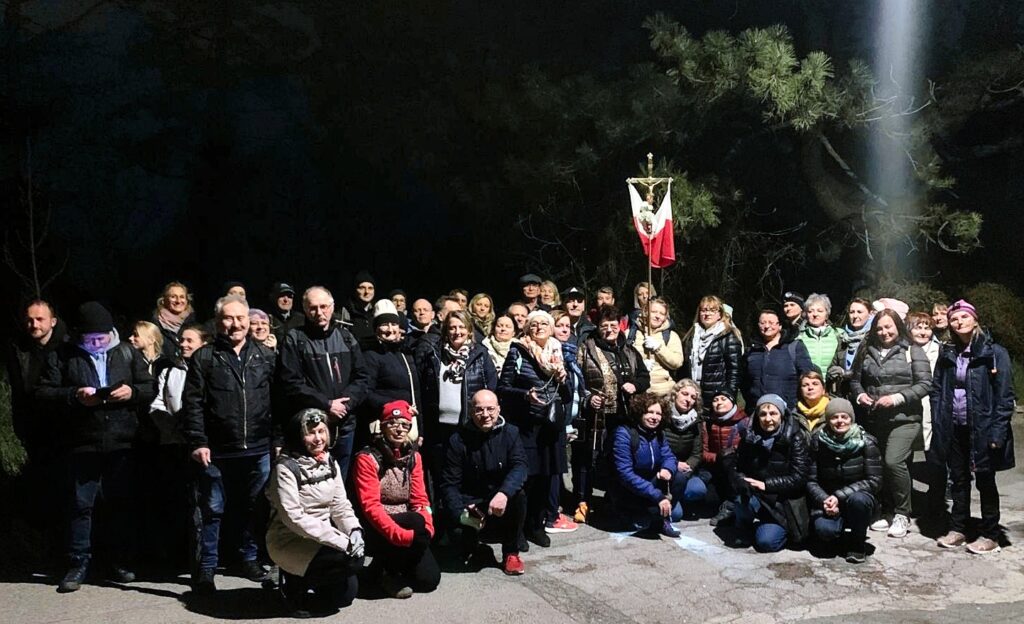
From Kahlenberg to the Papal Cross – Polish Night Way of the Cross in Vienna
Heschel Centre for Catholic-Jewish Relations at the Catholic University of Lublin
15 April, 2025
2 min
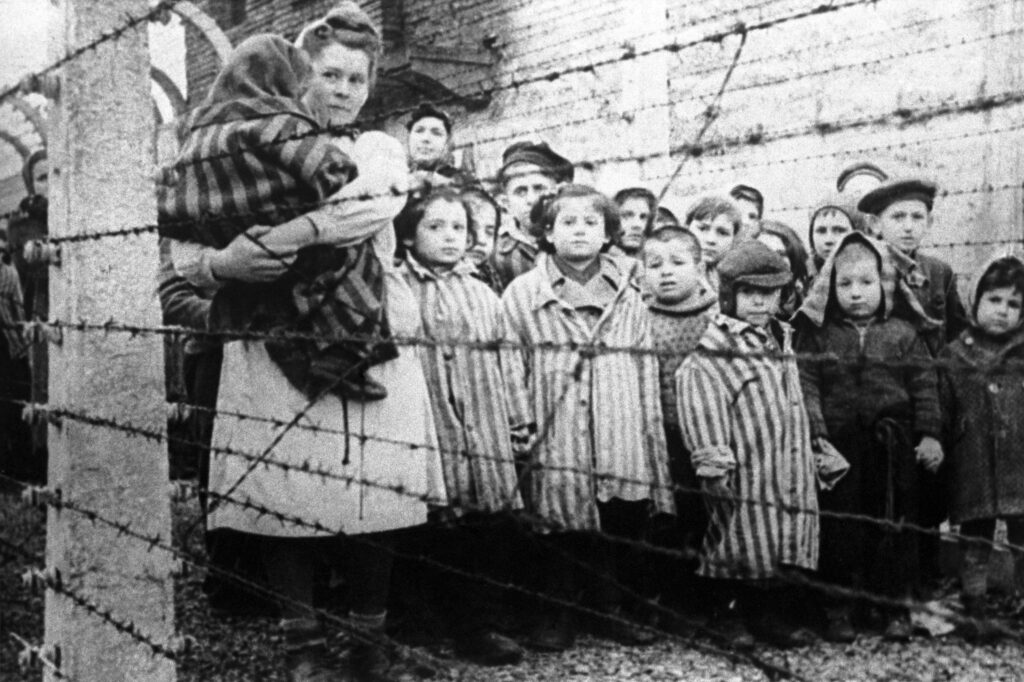
“I Will Never Be Herod for the Innocents”
Wlodzimierz Redzioch
14 April, 2025
6 min
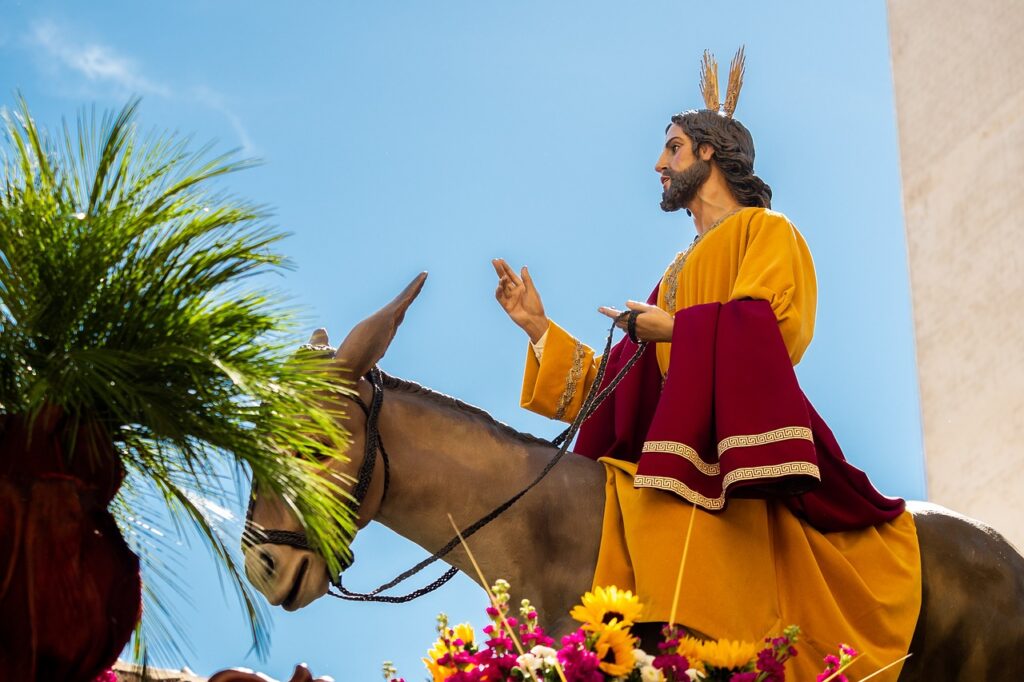
Reflection by Bishop Enrique Díaz: On a Donkey
Enrique Díaz
13 April, 2025
5 min
 (EN)
(EN)
 (ES)
(ES)
 (IT)
(IT)


